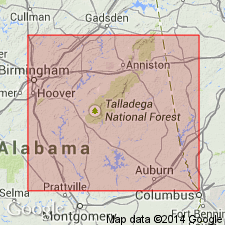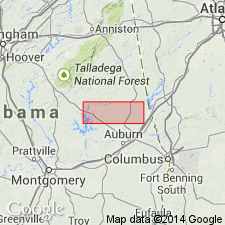
- Usage in publication:
-
- Sougahatchee granite
- Modifications:
-
- Named
- Dominant lithology:
-
- Granite
- AAPG geologic province:
-
- Piedmont-Blue Ridge province
Summary:
Basic rocks of the older intrusives of Dadeville belt are cut by granitic intrusives, the larger and more conspicuous areas of which are shown in a general way on the sketch map. The granite is here named Sougahatchee granite, from the creek near which it is exposed at many places in southwest border of Dadeville belt. Sougahatchee is much more gneissic than Pinckneyville granite. No age stated.
Source: GNU records (USGS DDS-6; Reston GNULEX).

- Usage in publication:
-
- Sougahatchee
- Modifications:
-
- Not used
- AAPG geologic province:
-
- Piedmont-Blue Ridge province
Summary:
Felsic gneisses in the Dadeville Complex originally called Sougahatchee granite by Adams (1933) were later called Rock Mills-Camp Hill granite and gneiss by Bentley and Neathery (1970). The Camp Hill Granite Gneiss of Raymond and others (1988) is here redefined as Camp Hill Gneiss and Chattasofka Creek Gneiss. [It appears that name Sougahatchee is no longer used.]
Source: GNU records (USGS DDS-6; Reston GNULEX).
For more information, please contact Nancy Stamm, Geologic Names Committee Secretary.
Asterisk (*) indicates published by U.S. Geological Survey authors.
"No current usage" (†) implies that a name has been abandoned or has fallen into disuse. Former usage and, if known, replacement name given in parentheses ( ).
Slash (/) indicates name conflicts with nomenclatural guidelines (CSN, 1933; ACSN, 1961, 1970; NACSN, 1983, 2005, 2021). May be explained within brackets ([ ]).

